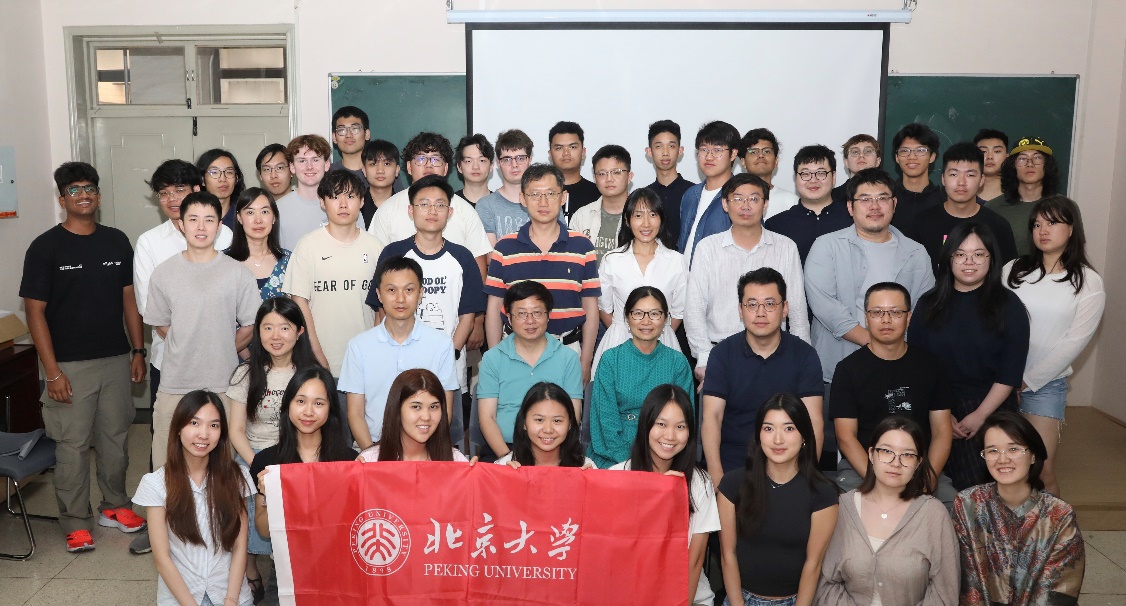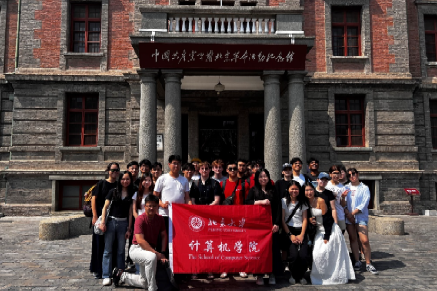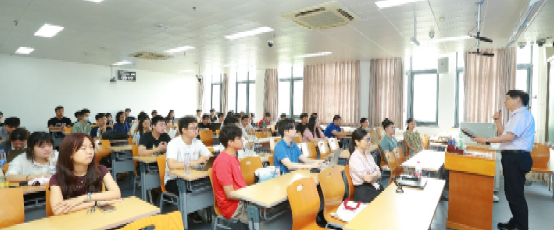From June 31 to July 11, 2025, the School of Computer Science at Peking University successfully hosted the third edition of its International Summer School, themed “Advanced Topics in Computer Science.” This year’s program attracted 23 undergraduate students majoring in computer science from globally renowned universities, including the University of Southern California, University of California Berkeley, University of Wisconsin–Madison, University of New South Wales, Nanyang Technological University, Chulalongkorn University, Hanoi University of Science and Technology, Universiti Sains Malaysia, as well as the Kenzhegali Sagadiyev University of International Business and Astana IT University. In addition, more than 30 outstanding students from universities across China joined the program, fostering a rich, diverse, and in-depth international learning atmosphere.

Over the course of two weeks, students delved into cutting-edge topics across the computer science spectrum, expanding their academic horizons and immersing themselves in a journey of knowledge and cultural exchange. This year’s summer school built upon the success of previous editions, with an upgraded curriculum that transitioned from foundational overviews to deeper explorations—fully showcasing the School of Computer Science’s signature “broad-spectrum” research strength. While the school boasts strong foundations in artificial intelligence, it also maintains long-term, systematic development across many subfields of computer science, forming a vibrant academic ecosystem.
The curriculum covered a wide array of topics, including programming languages, open-source data analysis, AI, embodied intelligence, ubiquitous computing, computational photography, computer vision, intelligent video transmission, software-hardware co-design optimization, modern adaptive computing, network and distributed systems, and peer prediction and collective intelligence. Thirteen experienced faculty members from the School of Computer Science delivered these lectures, balancing theoretical depth with practical application.
Faculty integrated cutting-edge theory with real-world examples, utilizing interactive lectures, group discussions, and hands-on projects to help students deepen understanding and strengthen their practical skills. This approach also sparked enthusiasm for research and innovation among participants.

Beyond classroom learning, the summer school also organized visits to the Microsoft Research Asia and Li Auto’s Beijing Factory to give students first-hand insight into real-world applications of computer science. At Microsoft, students explored the company's development history and engaged with leading-edge AI technologies. They enthusiastically interacted with virtual characters powered by intelligent voice interfaces and experienced immersive VR devices. At the Li Auto factory, students toured an automated production line and witnessed the advanced manufacturing processes behind China’s domestic new energy vehicles, gaining a deeper appreciation for the integration of technology and industry.。

A research and campus life sharing session featured current international graduate students. Master’s students Shi Ran, Lawrence, and Raheel (from Malaysia and Bahrain) and PhD student Shui Jie (from Singapore) shared insights into their research projects and diverse student life at PKU. Their presentations were rich in content and delivered with enthusiasm, offering a vivid glimpse into the academic and cultural experience of international students at PKU. The session was lively, with attendees showing great interest and engaging in enthusiastic Q&A and discussion.
The summer school also included a visit to the historic Peking University Red Building—widely regarded as the birthplace of the university and a landmark of China’s modern political and cultural history. As the origin of the May Fourth Movement, the Red Building symbolizes the awakening of China’s youth and the spirit of national reform. Students were deeply moved by the historical significance of the site and gained a richer understanding of China’s modern history and the cultural legacy of PKU. Martin and Lang, from the University of Wisconsin–Madison, shared that the visit gave them a profound perspective on China's revolutionary journey and the development of Peking University.

At the closing ceremony, Professor Hu Zhenjiang, Dean of the School of Computer Science, expressed that the summer school provided a valuable opportunity for students from top global universities to gain an in-depth understanding of Peking University’s strengths in computer science. Through a carefully structured curriculum and vibrant academic interactions, students experienced the school’s featured broad-spectrum academic structure and engaged directly with PKU faculty and peers. Professor Hu encouraged students to continue exploring the frontiers of technology and warmly welcomed them to return to the school for future graduate study.

Students also shared their reflections at the ceremony. Nathan from the University of Wisconsin–Madison commented, “The program was systematic and comprehensive, with a clear progression from basics to advanced topics. I was particularly impressed by the open-source data analysis course—it provided practical coding resources I’ve never seen offered at my own university.” Evonne from Nanyang Technological University said, “In the ubiquitous computing class, I learned about human-centered, application-driven research approaches. I was amazed by the use of Wi-Fi signals to detect human movement. In the embodied AI course, we explored challenges in data collection and learned how synthetic data can be used to train vision-language-action models to operate robustly in dynamic environments.” Taksaphorn from Chulalongkorn University shared, “The programming language overview course introduced me to more languages than I’ve ever seen before.” Several students also mentioned being fascinated by the 16-camera setup demonstrated during the computational photography course. Charlotte from the University of New South Wales remarked, “The professors were excellent—many are active in both academia and industry, which gave the lectures a strong real-world connection. The program also made commendable efforts to support English-speaking students, which helped non-Chinese speakers participate with ease.”
Students agreed: “These two weeks have been some of the most joyful moments of our lives. We’ve learned a wealth of knowledge, discovered Chinese culture, and built friendships with peers from around the world. As we return to our home countries, we carry with us not only new skills and insights, but also lasting cross-cultural bonds that will inspire our future growth.”

Professor Zhou Minghui, Vice Dean of the School, awarded certificates of completion to all participants. She encouraged the students to cherish the knowledge and experiences gained during the program, and to carry forward PKU’s spirit of innovation and excellence in their future academic and professional journeys.

In summary, the 2025 International Summer School on “Advanced Topics in Computer Science” provided a rare and inspiring platform for global students to dive deep into cutting-edge topics in a short period of time. It fostered international collaboration, broadened students’ global outlook, and enhanced their cross-cultural communication skills. The program not only supported academic growth, but also laid a strong foundation for future international research and talent development.
Looking ahead, the School of Computer Science at Peking University remains committed to advancing high-level international academic exchange and building an open, globally engaged educational environment. We eagerly look forward to seeing these outstanding young talents shine in the world of technology and make meaningful contributions to society.
Author: He Wenbin